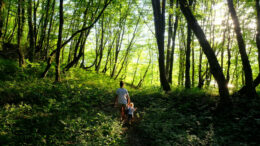The natural world faces many threats, but to many environmentalists, none are so baffling and heartbreaking as public apathy toward those threats.
How do we get more people to care about the natural world so they’re moved to stand up and defend it? The answer is complex, of course, because humans are complex. But part of it can be found in a simple truth: Some people don’t care much about the natural world because they haven’t experienced nature directly.
For years experts have pointed to a potential solution: Getting people to spend more time in nature, they say, can help make them care more about threats to our environment and adopt more pro-environment behaviors.
Does this popular wisdom work? A new study synthesizes the evidence from a dozen other studies and finds there’s some truth to it.
“Personal contact with nature, especially at an early age, can strengthen an individual’s emotional affinity to it, facilitating their motivation to adopt pro-nature behaviors,” says ecologist Masashi Soga, the study’s lead author and an associate professor at the University of Tokyo.
According to the research, more time in nature results in caring more about nature and, therefore, being more willing to change behavior to promote better conservation outcomes.
“Those who frequently experience nature are more likely to recognize … environmental decline in their surroundings,” Soga says by email. “This may, in turn, increase their motivation to contribute to mitigation efforts.”
Specifically, Soga says, he and his fellow researchers found that “direct experiences with nature might increase altruistic and pro-social behavior, promoting environmentally sustainable behavior and decision-making.”
The new analysis looked at studies from all over the world. Each looked at people’s experiences, ranging from visiting parks in a city to birdwatching in a forest or participating in nature cleanups and organized tree-plantings. A wide variety of pro-environment behaviors resulting from spending time in nature were measured by these studies, ranging from recycling (and not littering) to being more conscious about energy usage and driving less.
Across the board the studies showed that people who did more in nature were more willing to change their behavior to protect it.
“Enhancing people’s experiences with nature might be one approach to encouraging desired behavioral change to halt biodiversity loss,” Soga says. And conservation policy to stop extinctions, he says, “would likely benefit from expanding efforts to reconnect people to nature.”
Getting to that point, though, requires some effort.
How Do We Actually Get More People to Experience Nature?
Early exposure to nature is especially important, but increasingly rare for kids born in urban areas. The University of Miami lab where I got my Ph.D., for example, took middle-school and high-school science classes out on shark-tagging expeditions, and I was always shocked at how many kids who lived an hour’s walk from the coast had never seen the ocean.
Fortunately some groups are working to change this, including one in the nation’s capital.
“Washington, DC, is a wonderful place with lots of nature nearby, but not all populations have the same access to it, so we’re working to expand that access,” says Dan Ebert, director of communications for the City Kids Wilderness Project.
City Kids takes children from the DC area to local hiking and rock-climbing events year-round, and to a ranch in Wyoming for summer camp. Students start in middle school and participate through high school, with older kids mentoring younger ones.
View this post on Instagram
“We also incorporate conservation education into our trips,” Ebert says. “We see a lot that kids have a newfound appreciation for nature, they find themselves relaxing a lot more, and their anxiety is lower when they’re spending time in nature. Kids find themselves in nature, and of course that translates to wanting to help conserve and protect it.”
But you don’t need to be a kid to experience nature for the first time and derive benefits from it. Another group that brings people out into nature is Black Girls Hike, which organizes events both for beginners and experienced adventurers. “We do lots of outdoor activities like hiking, kayaking, birdwatching, and more with the goal of introducing Black girls to nature and destigmatizing what it means to be Black in nature,” says Black Girls Hike CEO and founder Asia Bright. “In our four years of existence, thousands of people around the world have joined us for some time in the great outdoors. Some peoples’ minds explode when they realize there are no skyscrapers in sight and no cell service!”
View this post on Instagram
Bright agrees that spending more time in nature makes people think about conservation more.
“The more people who can see the effects of what they do on nature, the more people who can see the state of the natural environment, the more people who can be awakened to caring about the environment and awareness of how their actions can cause harm,” she says.
Nature Is Where You Find It
For both children and adults, Soga points out that “nature” doesn’t have to mean isolated pristine wilderness. We can bring nature closer to where people already are.
“Many current policies focus on the creation and preservation of urban green spaces as a means to mitigate biodiversity loss,” he says. “But given the impact of peoples’ lifestyles and behaviors on biodiversity, our results suggest that these places can also help with biodiversity conservation by fostering connection between urban dwellers and the natural world.”
“People need to be outside more,” Bright tells me. “It’s about introducing people to the benefits of the outdoors and teaching them to care for the environment.”


